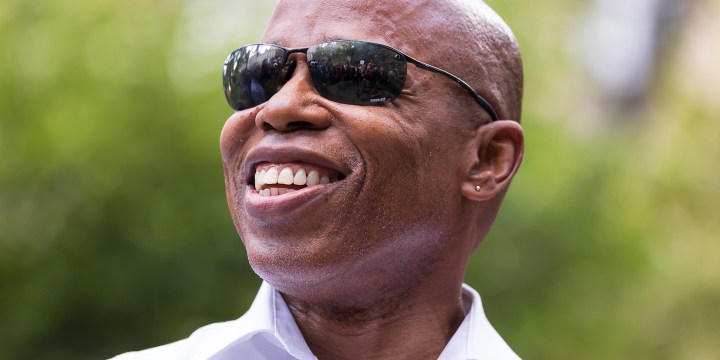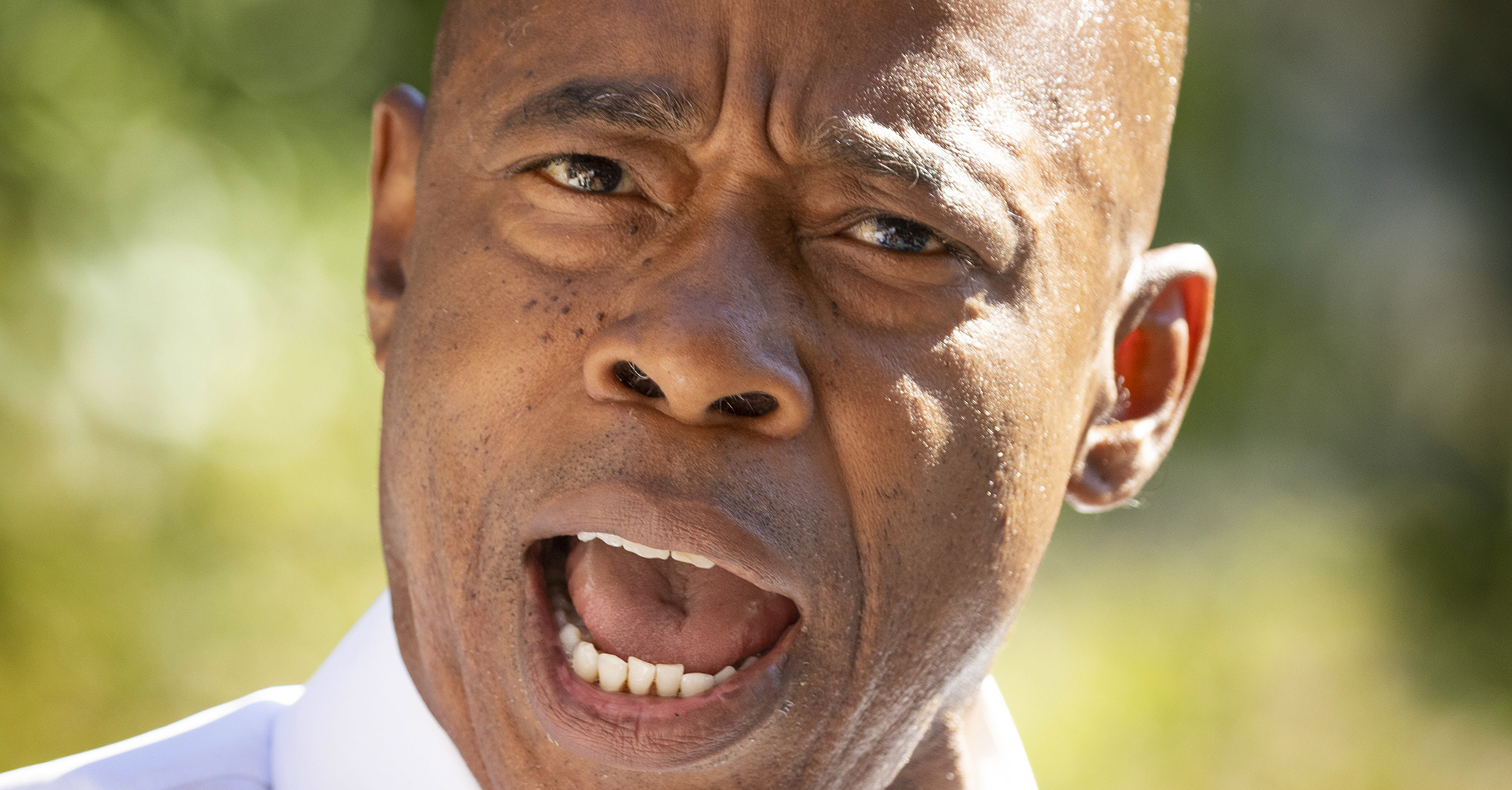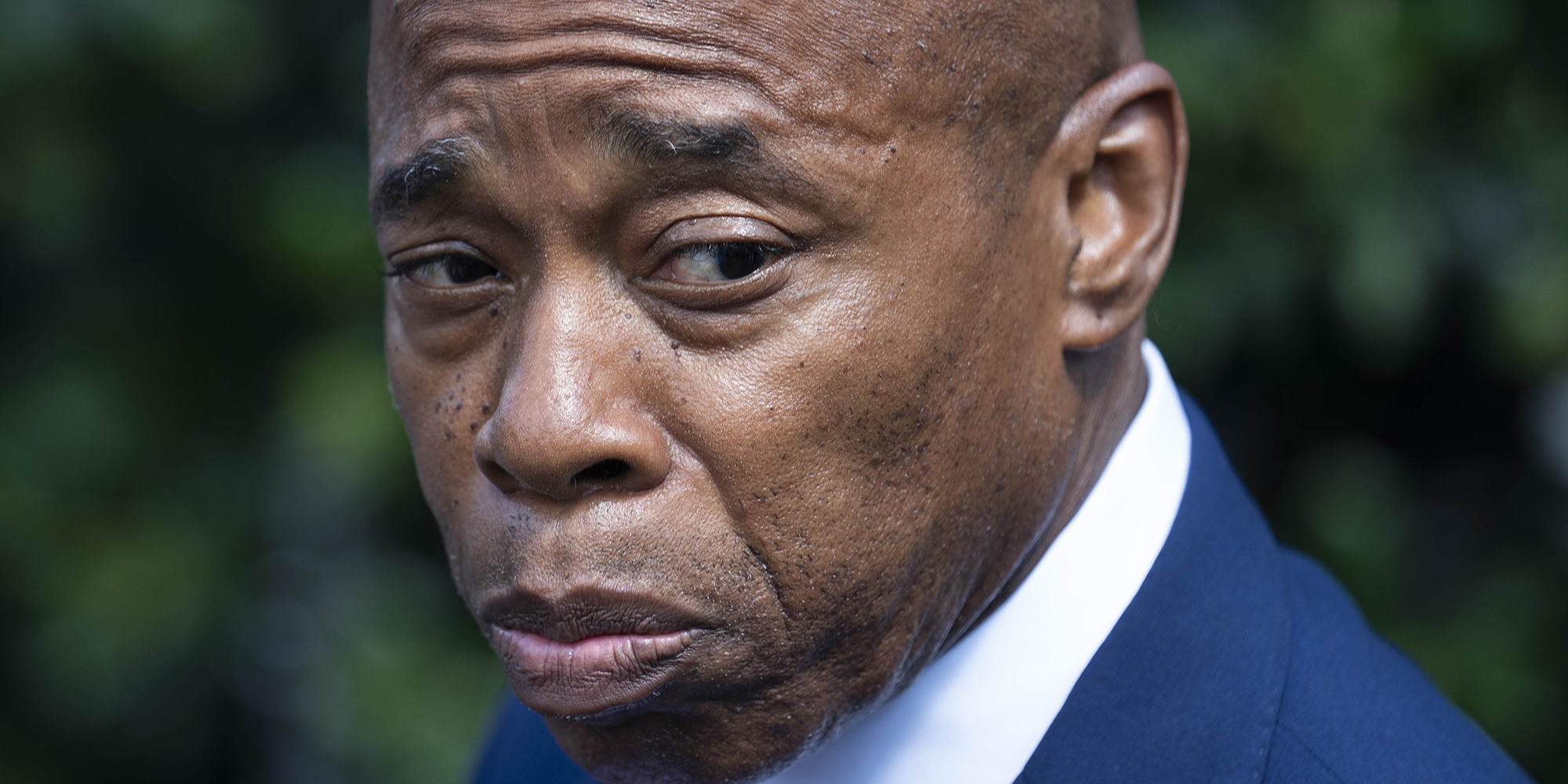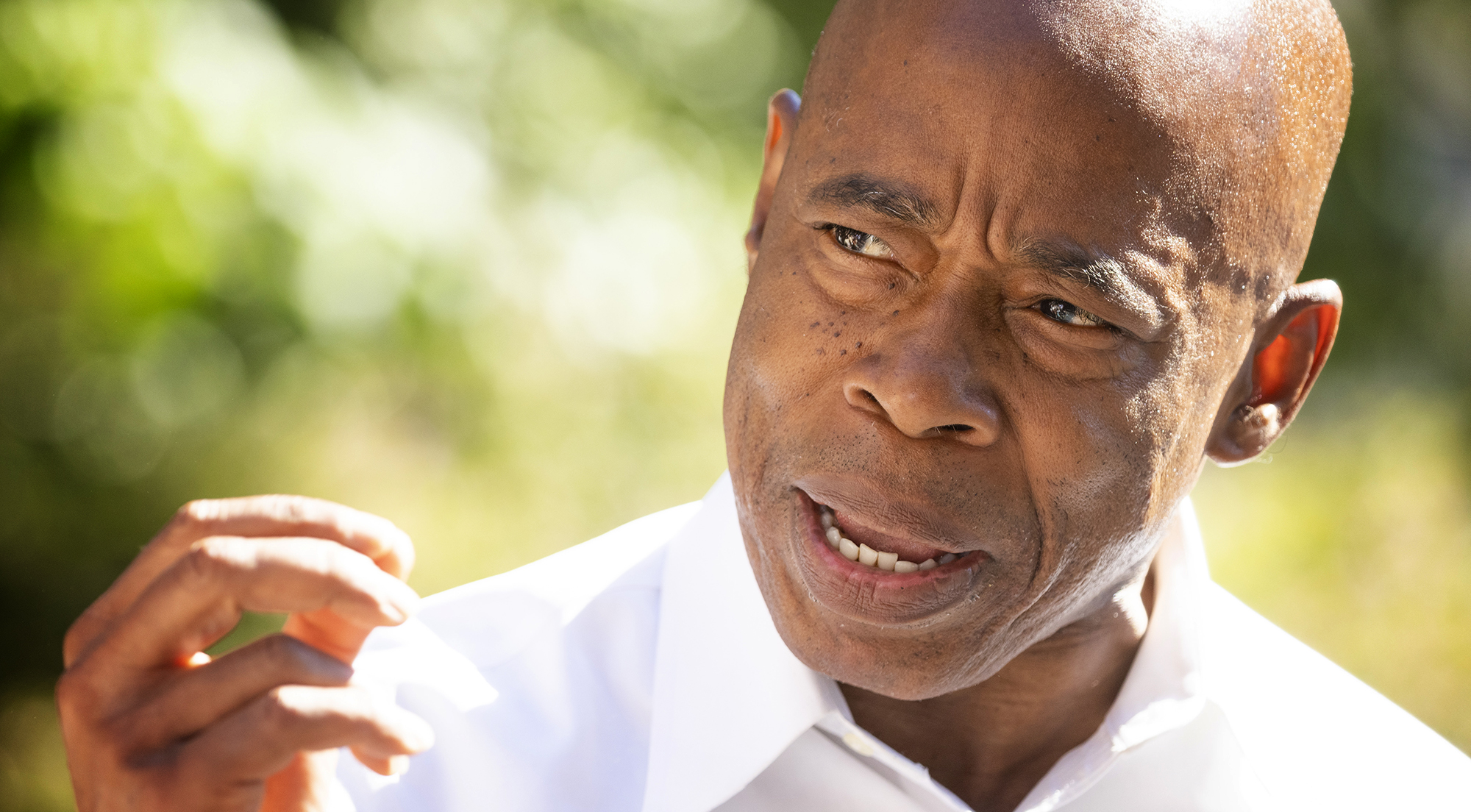US POLITICS
The Return of the Centrists — Is mayoral candidate Eric Adams the Big Apple’s Jedi Knight?

A former police captain is poised to become New York City’s second black mayor, but with pledges to strengthen the cops and schools and to recruit new business to the city that never sleeps. Can he do it? What kind of man is he?
The US’s Democratic Party, throughout its history, has oscillated between near-revolutionary ardour and roll-up-your-sleeves-get-something-done centrist values. Go back far enough and the Jeffersonian ideal for the party when it was founded at the dawn of the 19th century was nourished by the revolutionary ideas of the new country and revolutionary France, married together with the admiration Jefferson placed on a republic built on sturdy yeoman farmers.
The exception, of course, was in the institution of slavery that helped underpin much of the nation’s economy, although Jefferson himself was wise enough to recognise the corruption of the slave economy could eventually be the cause for the downfall of the party and the country, as he had likened the “peculiar institution” to “a fire bell in the night”. In his dream, too, there was also his hope that the community of farmers could withstand the corrupting influence of the cities.
By Andrew Jackson’s time as president in the 1830s, his Democratic Party had come to represent the rise of the so-called common man in the more settled regions as well as the newly established states between the Appalachian Mountains and the Mississippi River. Jackson’s warm embrace neither included Native Americans nor slaves, but it did help set in motion the drive for a more inclusive franchise and political participation, and the actions of an active citizenry so extolled by Alexis de Tocqueville in his influential study of American values, Democracy in America.
In later years, the Democratic Party came to rest on the support of the white supremacists of the South, populist farmers, ranchers, and miners of the new West and Rocky Mountain states, and the gradually growing power of machine politics in the larger cities of the country such as New York City, Philadelphia, and Boston that drew support from new immigrants such as the Irish — in opposition to the country’s more established farmers, business interests and main street leaders in the country’s smaller cities and towns. In many ways, though, the Democratic Party’s national politics often remained largely conservative in nature.
It took the Great Depression and the appropriation of ideas from the country’s small but vigorous Socialist Party to launch Franklin Roosevelt’s near-revolutionary appeal and that brought in an activist government, the national government’s social safety net, serious regulation of industry and finance, and policies that offered alternatives to local charity for the unemployed.
In doing so, Roosevelt built a Democratic Party that brought together the South (albeit one still under the thumb of a white aristocracy), the increasingly impoverished farmers of the Midwest, the now-big city populations of first-generation immigrants and other hyphenated Americans, together with people previously in sync with the Socialist Party’s ideas over two generations. Paradoxically, the voting power of the big cities depended upon the mass mobilisation of votes by party bosses, offering favours and city benefits in exchange for rigid adherence by those voters to direction from those bosses about how to cast their votes.
Such dynamics periodically encouraged reform campaigns in many of those cities to “clean up City Hall” or “throw out the corrupt bosses”. As a result, local politics has also demonstrated its own oscillations as grassroots activists would coalesce around an effort to push back against the old guard and take their places instead.
In the most recent cycle, coming roughly from about the middle of the Trump administration, a growing fury over police misconduct or worse against black citizens (such as the death of George Floyd) in many cities had led to a national wave of “Black Lives Matter” protests. Concurrently, a wave of younger politicians — exemplified by the rise of political neophyte Alexandria Ocasio-Cortez, who defeated a long-serving Democratic congressman in the primary and then won the general election in her district — have been eager to move from citizen activism on to the formal political stage. This came along with slogans such as “defund the police”, as well as various other social and economic policy prescriptions, often coming out of the writings and activism of the Democratic Socialist movement, exemplified by Vermont Senator Bernie Sanders.
Given the visibility of such activism, it might be easy to assume — as some commentators have done — that the newest texture of the Democratic Party, and thus national politics more generally, will emerge from an alliance of the historically disadvantaged, the nation’s underclass, workers who have now recognised their real circumstances, young people overwhelmed by student debt, and working women.
The argument was that rather than the incrementalism of politics as usual, this alliance would be the real pathway for resisting Trumpianism and some fundamental changes to things. In turn, it would include the re-incorporation into the democratic movement of the working class, once they understood the utter falsehoods of that Trumpian, pseudo-populist siren call.
These hopes for a broad social and economic change agenda — and now, most visibly in rallying cries like “defund the police” — may, however, be running into important political and social realities. And those realities may also be shifting the balance of power and ideas in the Democratic Party towards centrists — with powerful impacts in the political system.
Take the especially charged issue of policing. While defunding police departments has become a popular theme for many progressives over the past two years or so (even if they relitigate that they really mean shifting resources to social services to deal with potentially non-criminal issues), surveys now suggest the average person — black and white both — is much more concerned about rising crime rates than a philosophical point.
As Center for American Progress Fellow Ruy Teixeira wrote the other day, “Crime is a great example of this. Initially dismissed as simply an artifact of the Covid shutdown that was being vastly exaggerated by Fox News and the like for their nefarious purposes, it is now apparent that the spike in violent crime is quite real and that voters are very, very concerned about it. According to recent data from the Democratic-oriented Navigator Research, more Americans overall, including among independents and Hispanics, now believe violent crime is a ‘major crisis’ than believe that about the coronavirus pandemic or any other area of concern. Moreover, majorities of even Democrats now believe violent crime is a major crisis and concerns are sky-high among black voters (70 percent say it’s a major crisis). Similarly, the latest USA Today/Ipsos poll (June 29-July 6) finds crime and gun violence topping the list of issues that worry Americans.
“The public response leans heavily in the direction of more policing, not less, countering the defund the police approach that was promulgated by many on the Democratic left and still holds considerable sway in those quarters. The same USA Today poll found 77 percent support for deploying more police to street patrols and 70 percent support for increasing police department budgets. In contrast, defund the police clocks in at just 22 percent support and is even opposed by black respondents 60-38.
“Concern about public safety is especially high in urban areas, particularly among nonwhites. In heavily black Detroit, a USA Today/Suffolk University//Detroit Free Press poll found: Amid a jump in violent crime in this and other cities nationwide, Detroit residents report being much more worried about public safety than about police misconduct… By an overwhelming 9-1, they would feel safer with more cops on the street, not fewer… In Detroit, 1 in 5 residents (19%) cited public safety as the biggest issue facing the city, second only to education, named by 23%. On a list of eight concerns, police reform ranked last, at 4%… Black residents ranked crime at the top of their list of concerns: 24% cited public safety, and just 3% named police reform. But white residents were a bit more concerned about police reform than public safety, 12% compared with 10%.”
Perhaps this difference derives from the fact that many African Americans see their neighbourhoods as the ones most directly affected by rising crime.
Thus there seems to be a moment here for more centrist Democrats to turn their party’s public discourse a bit more their way. It is not just the fact that President Joe Biden may be on the cusp of achieving a major win with infrastructure building/rebuilding legislation in Congress, with the support of a significant number of Republican senators (although this measure would not include the social infrastructure measures the progressive caucus among Democrats so much wishes to see passed). But it is also the reality that a number of centrist Democrats have been beating off challenges from the left in their party in primary races — for an open congressional seat in Ohio, for the Virginia governor’s race, and perhaps most importantly, with the winning candidate for the Democratic Party’s nomination for mayor of New York City, Brooklyn borough president, Eric Adams, an African American, and a former police captain (and a vegan and type 2 diabetic just for good measure).

Brooklyn borough president, Eric Adams. (Photo: EPA-EFE / JUSTIN LANE)
Discussing Adams’ positions, a recent Politico Playbook newsletter had noted, “On the campaign trail during the primary, the former NYPD captain rejected the ‘defund the police’ movement and took hits for standing by ‘stop and frisk’ years ago. But he’s also been an advocate of police reform and will be talking with Biden about the need to crack down on handgun smuggling that results in thousands of deaths each year in brown and Black neighborhoods.
“This is the direction Democratic elders hope the party will move: away from slogans like ‘defund the police’ that they see as politically harmful — and which nearly cost them the House majority in 2020 — and toward a more nuanced, measured approach that’s both pro-police and pro-police reform.
“That’s especially true right now, as the Democratic majority faces tough odds in the 2022 midterms. Republicans are already seizing on the 30% increase in homicide rates in more than 30 cities nationwide, trying to paint the administration as soft on crime and unable to protect families.
“Adams’ victory — a relative moderate in New York City politics, who ran on a tough-on-crime platform — has given Democratic leaders hope that their base now gets this.”
Somebody like Adams may soon become a significant counterweight to the impact of people like Senator Bernie Sanders and “the squad” congresswomen, most especially Representative Ocasio-Cortez, who actually represents a reliably Democratic district in New York City in Congress.
Adams’ victory came in one of the first real tests of ranked choice voting for a major US election (where voters would weight their choices in terms of preference). Significantly, in a large field of candidates, he beat a former candidate for the Democratic presidential nomination in 2020, business figure Andrew Yang, who had already had achieved vast media exposure since 2019, as well as a number of more “progressive” Democratic figures in New York City.
Given the overwhelming Democratic voter majority in the city, his victory over Republican candidate Curtis Sliwa, the beret-wearing founder of the “Guardian Angels”, a subway/train/bus, non-government, citizen protection project back in the 1970s, is almost certain. Following his almost-certain election in November, Adams will automatically become a major public figure nationally.

Borough President of Brooklyn Eric Adams speaks to reporters on 12 July 2021 outside of the West Wing of the White House following a meeting with US President Joe Biden on the administration’s strategy to reduce gun crimes in the United States. (Photo: EPA-EFE / SARAH SILBIGER / POOL)
After the election, he will almost immediately be a major, or even the informal spokesman for urban issues nationally, especially given his close proximity to so much of the nation’s media, finance, business leadership, and the NGO sector, by virtue of being in New York City, the nation’s largest city. Especially due to his background and experience, he will have instant credibility in speaking for minorities and the white working class, in a way that more “woke” politicians may never truly succeed at doing.
Most of all, if he can forge good alliances with the president, the two Democratic senators from New York, Charles Schumer and Kirsten Gillibrand, Governor Andrew Cuomo (or his successor if he is forced to leave office), and Marcia Fudge, the Biden administration’s secretary of housing and urban affairs, Adams’ national stature will grow. (It should be noted that being New York City’s mayor has never successfully become a solid stepping stone to the pre-eminent national office, even if being the state’s governor has served that purpose several times in the past.) But if his term of office as mayor is seen as successful, his name might conceivably enter into the mix in some way, come 2028.
In reporting on his win, The Economist noted his style, saying, “ ‘Some people talk about police brutality. I want to tell you how it is to live through it.’ So begins the video that launched Eric Adams’s mayoral campaign. In the clip he stands outside the police station in Queens where, when he was 15, police beat him and his brother. Despite this experience, or maybe because of it, he later joined the police force, eventually becoming both a police captain and a prominent internal critic of racism and brutality at the NYPD. In his campaign he blended a call to reform the police with respect for the badge and a pledge to crack down on crime.”

Instead of defunding the cops, Eric Adams insists that reforming police departments is the right stance, arguing, ‘The prerequisite for prosperity is public safety.’ (Photo: EPA-EFE / JUSTIN LANE)
For decades, the way to win the mayor’s race was to construct a coalition out of voters from beyond Manhattan, especially among white voters in the four, populous outer boroughs (Queens, Brooklyn, the Bronx, and Staten Island), the way Ed Koch and Rudy Giuliani did it. While Adams gave much attention to those areas and voters, he constructed a multiracial coalition of African-American, Dominican, Latino and Jewish New Yorkers, as well as building support among labour unions and among the city’s influential pastors.
His naturally unpretentious style was, for many voters, an attractive element of his character, especially given pledges to cycle, to use the subway, and even to do his own laundry. Speaking to character as well as the need for more, and better schools, he told voters, “If we don’t educate, we will incarcerate” — especially by increasing the number of charter schools, those independently operated public schools that appeal to parents frustrated with the city’s more traditional system.
In contrast to a number of his competitors for the nomination, Adams also positioned himself as a friend of business, especially in a climate where some firms and a growing number of employees have been moving to more business-friendly states such as Florida and Texas. Or as Adams said, “We are in the business of recruiting human beings. That is the job of a city, and we have been a terrible recruiter over these last few years.”
As a result, Adams plans a recruiting effort to attract workers — and businesses — from around the world to his city. New York City does, after all, in spite of everything, have numerous competitive advantages — and instant name recognition — especially in terms of the things it can offer to the kinds of employees and companies he hopes to recruit.
After his electoral success, The Economist editorialised about him, “The man New Yorkers will choose to pick up these pieces is Eric Adams, a black, vegan, ex-police captain from Brooklyn. In a crowded field, Mr Adams narrowly won the Democratic primary with support from a broad coalition of non-white, non-Manhattanites. As with President Joe Biden, his supporters were the working class, the elderly and minorities. He promises to be mayor for the Bronx and Brooklyn, not the Upper West Side.
“His victory in the primary election, and almost guaranteed triumph in the general one to come, is a rebuke to the progressive zeal that has overtaken America’s largest cities since racial-justice protests began more than a year ago. This is a growing movement that is almost contemptuous of the industries that generate urban prosperity. It sees specialised schooling for gifted pupils as oppressive; it interprets pathological housing markets as signs of too little governmental interference rather than too much; and it argues, in contradiction of common sense and political reality, that ‘defunding the police’ is the solution to rising crime. Its most enthusiastic adherents seem to be citizens comfortably insulated from both violence and from need.”
Instead of defunding the cops, Adams insists that reforming police departments is the right stance, arguing, “The prerequisite for prosperity is public safety.” That message clearly resonated, especially as shootings last year nearly doubled over 2019 and the number of violent crimes have risen, even in well-policed areas like Times Square.
The Economist added that Adams “…resists the patronising attitude, adopted by some progressives, that resurgent violent crime visited largely upon the poor is an acceptable trade-off on the path to social justice”. He says he wants to trim the city’s budget through cuts in its vast bureaucracy and to work aggressively to improve the size of the housing stock, especially since the data show that in the past decade, for every five jobs created in the city, only one new unit of housing was added to the pool.
The periodical added, “Mr Adams is right to say that new development must be rapidly approved in the city — and that the burden of change should be borne not just by poor neighbourhoods but also by posh ones like the charming, absurdly low-slung West Village.”
Still, some wobbles in Adams’ judgment have made their appearance. He has been uncomfortably unclear about whether he actually lives in the city most of the time, rather than in nearby New Jersey. There have been incorrect filings about his own finances, and as a man well-wired to the political machine, he undoubtedly owes favours, probably including some to friendly real estate developers. And on one occasion, he took the low road, insinuating two of his opponents in the primary tried to play the race card on him to defeat him. These things detract from public confidence in a man on course to take hold of a vast $100-billion (R1.5-trillion) government.
Still, despite such things, he offers the hope of being much more effective than his predecessor, Bill de Blasio, has been, especially in a city that has been so battered by the economic and public health effects of the Covid pandemic and the closures and lockdowns that have followed the disease. If one were to look for one word to describe him, most would probably agree that “pragmatic” fits best. New Yorkers and the rest of us will now get to judge if “successful” and “effective” will be added as well. DM

















 Become an Insider
Become an Insider
Comments - Please login in order to comment.